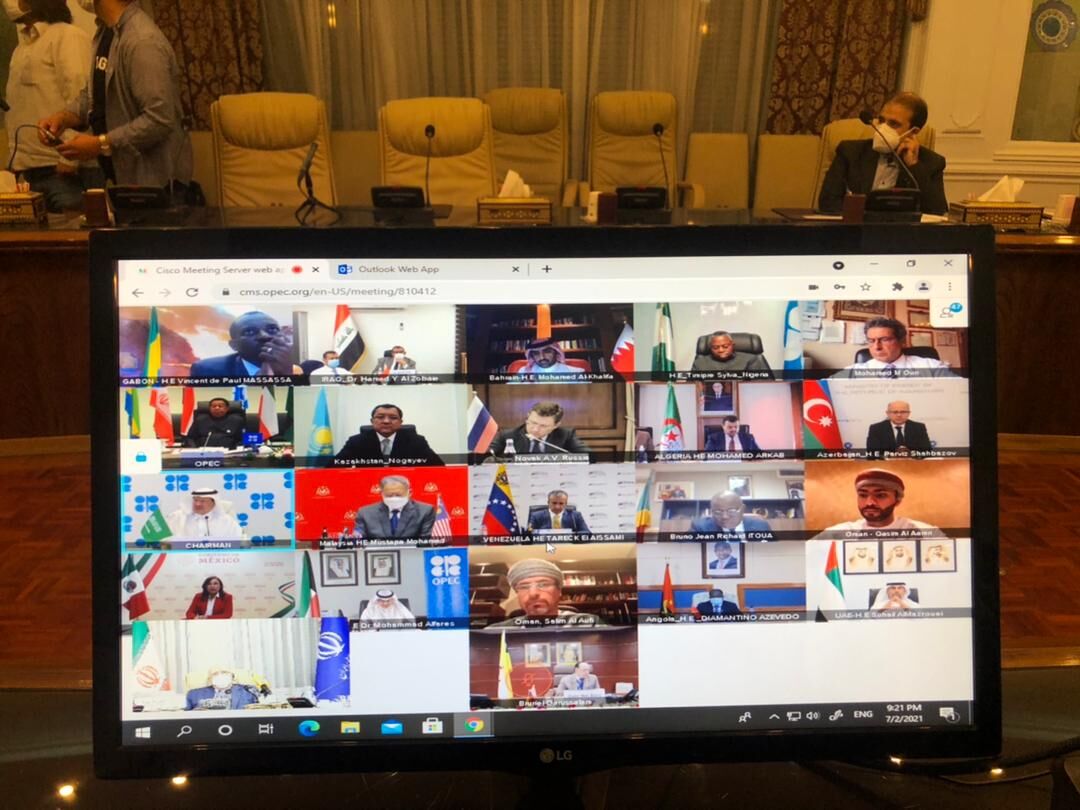TEHRAN (Shana) -- Last Thursday evening, at the opening ceremony of the 181st ministerial meeting of OPEC (Organization of the Petroleum Exporting Countries) – held online due to the COVID-19 circumstances, a brief exchange took place between the oil minister of Iran and the Saudi energy minister: a simple and seemingly routine friendly exchange but with a very important message for the bilateral relations between the two estranged Muslim and neighboring countries. As it happened, the brief exchange did not escape the attention of the keen observers across the globe. Fact of the matter is that since many decades ago OPEC meetings have come to play an important role in ending political disputes between Iran and its Arab neighbors; inclusive of the times of Mohammad Reza Shah Pahlavi and President Hashemi Rafsanjani.
In March 1975 (Esfand 1353), Mohammad Reza Shah and Vice-President Saddam Hussein attended the OPEC Summit in Algiers. At the time the tension between Tehran and Baghdad had heated up, including on the common waterway between the two countries and also the Kurdish question in Iraq. Through the good offices of the then Algerian President Houari Boumédiène, Shah and Saddam met with each other on the sidelines of the Summit, and signed the Algerian Accord, a short communique containing their agreement on the major areas of dispute between the two countries. The Accord served to develop into the Iran-Iraq Treaty Concerning State Frontier and Neighborly Relations, signed in June 1975, which, among others, recognized Iran’s sovereignty over half of the common waterway (Shatt al-Arab). Following the end of the Iran-Iraq War (1980-1988), the OPEC meeting also served as the conduit for Gholamreza Aghazadeh, the Iranian oil minister, to deliver, without being noticed by the press, the reply of the then President Hashemi-Rafsanjani to the Iraqi side – as detailed in the recently published memoire of Mr. Rafsajani. OPEC meetings have always been important for Iran, whether for its oil or for its politics.
Looking back at history and also looking to the future, one is tempted to believe that now seems to be quite a propitious time for resolving the on-going tension between Iran and Saudi Arabian through OPEC. Well, as is widely known, President-elect Ebrahim Raisie announced at his first press conference the other week that he does not find any problem with re-opening of the Iranian Embassy in Riyadh. I believe taking cue from the brief exchange last Thursday, he should task his incoming oil minister to pursue the matter seriously.
The 181st OPEC ministerial meeting opened with the screening of a documentary film, made by the OPEC Secretariat, in appreciation of Minister Bijan Zangeneh’s 16 years of participation in the work and activities of the Organization. Mr. Zangeneh, attending the Ministerial meeting for the last time while in office, took the floor right after the documentary was screened. Coming to the end of his statement, he prefaced his last sentence with the clause “My dear friends”, and expressed his gratitude and appreciation to a number of ministers, the second being Prince Abdulaziz Bin Salman, the Saudi Energy Minister. Once finished, his Saudi counterpart reacted with the following words: “Friendship with Mr. Zangeneh has been strategic and we haven’t limited ourselves to OPEC only, and have achieved successes. I am proud of friendship with Mr. Zangeneh, and take pride in being considered your friend. I would like to continue this friendship as long as I am alive.” Put in the context of the on-going tension between the two countries, exchange of such words between two effective OPEC ministers – a senior minister with 30 years of ministerial portfolio and a son of a king – should mean a lot, and with
reverberations. The exchange between the two men received wide coverage in the international press.
Minister Zangeneh will leave office in less than two months. But, it is definitely important that his successor at the Ministry utilize potentialities in OPEC towards helping resolution of tension between Iran and Saudi Arabia. Having observed and analyzed OPEC matters for quite a number of years, I believe Iran-Saudi cooperation in OPEC next year could serve both countries’ interests. The term of office of Secretary-General Mohammed Barkindo of Nigeria will terminate in 2022. Iran can lend support to the Saudi bid for that office, and instead enjoy the Saudi quid pro quo of giving Iran the position of OPEC’s department of Market Research – a position currently occupied by a Saudi national. Given Mr. Barkindo’s long service at the Organization and very close fraternal relations with both countries during his tenure, I believe he can play a good catalytic role in this matter. As far as the press are concerned, only one side of the OPEC coin – oil matters - usually receives attention and coverage. The other less-known side also has its own players. The message sent through the brief exchange last Thursday evening between the two ministers belongs to the other side.
Courtesy of Hamshahri Daily- Tehran, Iran
by: Reza Zandi


Your Comment